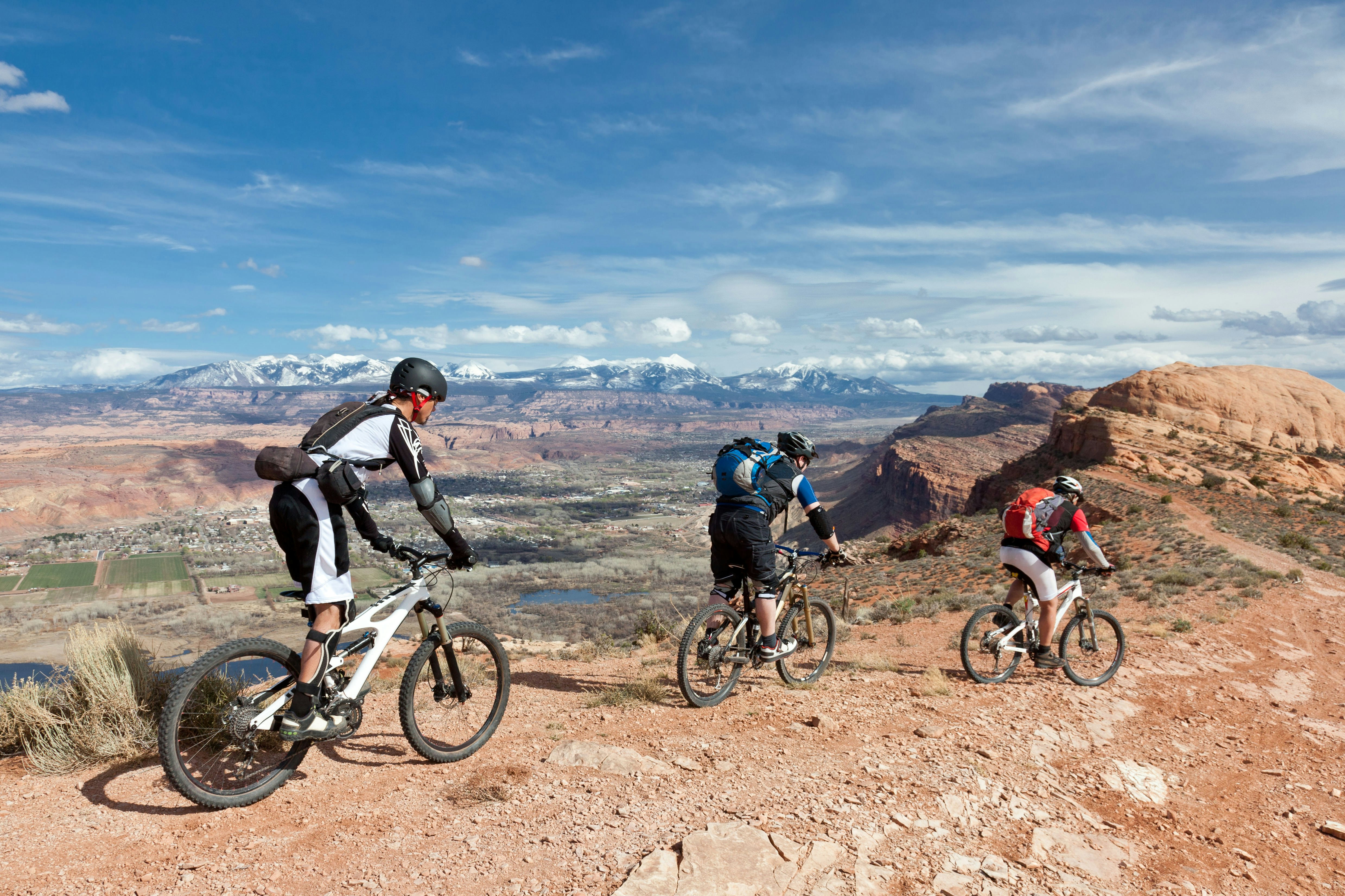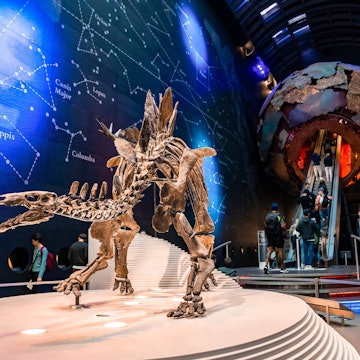

Many of the hikes around Moab, including the one to Bowtie Arch, are completely free © Tom Bol / Getty Images
Moab is a great destination for free adventures. Aside from the occasional park entry fee, the trails, rivers, canyons and wilderness surrounding town are all free to wander. There are even some ways to get into the Canyonlands and Arches National Parks for free, and you can save on accommodation by camping in some of the primitive campsites found on BLM and other public lands outside the parks.
Read on for more of our top tips for a budget-friendly trip to Moab.
Hiking Grandstaff Canyon
The five-mile hike through Grandstaff Canyon takes you to the 243ft Morning Glory Arch. It’s accessed just four short miles from Moab, so you can actually bike here and hike in. Expect big, red-canyon vistas, a few little streams and plenty of crowds.
Free days in the national parks
Most years the government provides around six free days in the national parks. This gives you access to the best hikes, canyoneering, climbing, rafting and adventuring to be had in Canyonlands and Arches. Got a fourth-grader? Turns out the national parks provide free passes for the entire school year!
One thing to remember: the US National Parks System relies on entrance fees to maintain trails, build visitor centers and protect the vulnerable ecosystems of this true national treasure. There are a number of annual passes, lifetime senior passes and other ways to access these parks on the cheap, while still making your contribution to this amazing system.

Mountain biking
Recent estimates indicate there are over 2000 miles of mountain biking trails outside of Moab. Some of our favorites include White Rim Road, the kid-friendly Bar-M Loop, the long downhill at Gemini Bridges, slickrock riding past dinosaur tracks on the Klondike Bluffs Trail, and high-altitude lung-busters at the Moonlight Meadow Trail. Some areas have nominal parking fees, and others are completely free. With new trails being built seemingly overnight, it’s worth checking in at a local bike shop to pick up a map and get advice.
If you're willing to shell out $2-$10, snag a pass to access the Slickrock Trail through the Sand Flats Recreation Area. Because the trail receives over 100,000 riders a year, it’s well worth the little added expense to pay for its preservation. What you get is amazing riding on one of the most iconic mountain bike trails in the world. Slickrock takes you over 12 miles of sandstone as you follow a marked path that takes you on swift downhills, some lung-bursting climbs and plenty of little drops and turns. For beginners, the 2.3-mile practice loop may be all you are able to muster on your first entry into the world of Slickrock riding.
Road riding
People ride around Moab on skinny tires too. Put on the spandex and hit the road with amazing desert rides to Island in the Sky, Deadhorse Point State Park and along the Colorado River. The Park to Park Trail takes you from Moab into Arches National Park – around a 30-mile ride – or you can turn off at the Colorado River and follow the path along Hwy 128. The best riding is had in spring or fall, when the temps are cool.

Floating the Colorado River
If you have a paddleboard, canoe or another floating device, you can paddle the Colorado River through Professor Valley with just a nominal parking fee. It’s a beautiful run with Arches National Park on one side and the road on the other. There are a few smaller class II riffles here, so it’s not advisable to do this in an inner tube. And for god’s sake, wear a personal flotation device (you might know it as a life jacket). It can save your life.
Hiking Moonflower Trail
Perfect for families with young kids, the Moonflower Canyon Trail is just 0.6 miles long, and gains a little over 120ft in elevation. There are some cool rock formations to scramble on here, and it takes you to a waterfall. It’s a perfect spot for an afternoon picnic. Pickup your provisions or a deli sandwich at the Moonflower Community Cooperative in town. The sunsets are free too!
Birding at Matheson Wetlands Preserve
Overseen by the Nature Conservancy, this 890-acre preserve just west of town has great views and is home to over 200 unique species of bird. Come in the spring to catch migratory birds, including songbirds, shorebirds and waterfowl. In the summer, yellow warblers, common yellowthroat, black-headed grosbeaks, lazuli buntings, song sparrows and great blue herons nest here. You can also spot beavers, muskrat, mule deer and other wild critters. It’s a really unique ecosystem, a lush oasis in a desert wasteland. A mile-long raised platform loop is handicap accessible.
Due to the delicacy of the ecosystem, the Nature Conservancy asks visitors to practice Leave No Trace – pack out what you pack in and avoid setting fires. Camping is prohibited.
Moab Free Concert Series
Held once a month from June to August most years, this friendly and funky concert series at the Moab City Ballpark brings in fun B-list national acts with occasional local stars opening up the stage. Expect hula hoops, food trucks, and shiny happy people holding hands.
Driving Monument Valley
Two hours south of here, take a detour to Monument Valley. This is the spot you’ll probably recognize from almost every American Western movie, with its towering monoliths and stark desert backdrop. The Monument Valley Tribal Park manages access to the area, and there is a small fee to get in. Worth it for the views that stretch to tomorrow. For a real treat, spend an hour just watching the clouds float by, their shadows dotting the desert landscape like little kisses from heaven.

(Almost) free camping
The Bureau of Land Management and National Forest Service (two chief managers for the public lands outside of town) are increasingly charging for camping even in the primitive sites. This is generally just $15 a night and goes to maintaining the campsite in an area that’s seen visitation skyrocket in recent years. Probably worth the extra cashola. There are a few things you need to keep in mind when camping off-grid here. One: watch where you camp and where you set up. A tent over just a twig of grass is tantamount to a high-plains flora homicide. Two: Only camp in already established sites. Three: Only do fires in established fire pits. Four: Kind of gross… you need to pack out your poop, so bring a portable toilet (sometimes called a groover). Five: Have fun, be respectful. It’s a unique privilege to be able to use these public lands.
Free water at Matrimony Spring
They say the best things in life are free. As you turn up the Colorado Scenic Byway on Hwy 128, you might notice people pulled over at the side of the road tucking water bottles under an innocuous pipe. This is the Matrimony Spring. It’s some of the best water you will ever taste (and yes it’s safe to drink).
You might also like:
The best time to visit Moab for desert wildflowers, stargazing and more
17 top adventures in and around mighty Moab
Best outdoor activities in southern Utah
















